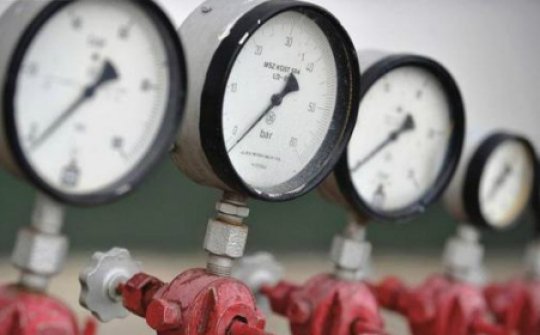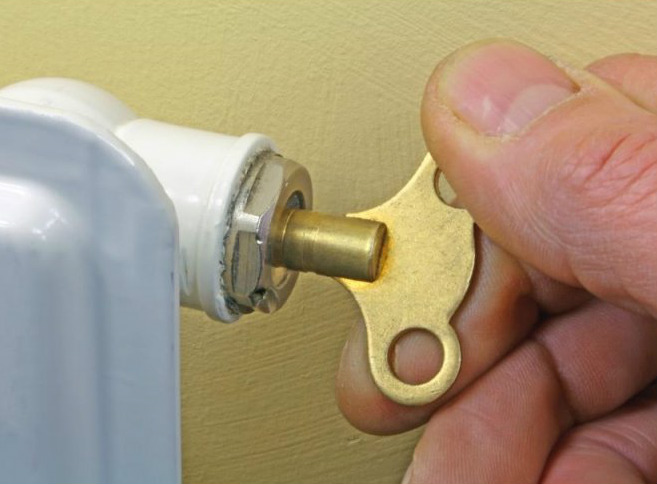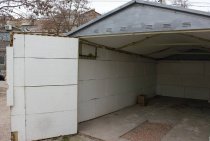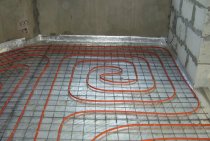How to take care of your heating system in summer
In summer, it is necessary to remove the coolant from it, or, more simply, drain the water. In an empty system, the quality of pipes and batteries, the reliability of connections and the degree of contamination of the system are checked.
In warm weather, it is easier to eliminate all possible malfunctions in order to avoid various unnecessary problems in winter, when the uninterrupted operation of the heating system is necessary.
- First of all, you need to examine the system in detail for leaks. If there is a leak in the heating pipe, it can be identified by a rusty tint on the surface of the battery or pipe, there may also be traces of moisture dripping onto the floor, usually they are localized at the junctions of the pipes.
- As soon as you can localize the leak, you need to reconnect the pipe fragments here or seal the radiator sections so that the system does not depressurize in winter and big problems begin.
- It is necessary to replace the water in the system annually, since it is usually untreated there and it must be cleaned of impurities that could pollute the flow due to corrosion processes in the pipeline, as well as waste from the boiler.
After draining the water, flush the system until the water supplied to the inlet is clear and clean, once you have achieved this effect, you can fill the system. The boiler also needs to be inspected annually, be sure to inspect the heating elements in them, if necessary, they need to be cleaned, check the contacts in the starting box, they must be ground, loosen the wire connections and re-tighten so that there are no poor-quality connections.
If you have a gas boiler, then it is better that the specialists who installed it, who have permission to work with gas appliances, carry out preventive maintenance. They should check the quality of the connections on the communications, at home this can be done with soap suds, if you apply it to the pipe connection area, you also need to look at the chimney, burner and the functioning of the ignition system.
Even if the boiler is out of warranty, you cannot independently disconnect the gas communications and clean the burner. If you are carrying out preventive maintenance of a solid fuel boiler, then you need to clean the firebox, pyrolysis chamber and chimney.
All this work can be done with a special metal brush, you should have a minimum of soot and plaque left so that the system is as clean as possible. Of course, heating does not work in the summer, but it is necessary to prepare for the winter.
- There is also a chemical flushing of heating systems, it can be done not every year, but depending on how high-quality water you use.
- If a specially purified liquid is used, then it can be omitted at all, but if you use ordinary water, then during the operation of the system you will form scale, which can interfere with the circulation of water and reduce the efficiency of the system, that is, chemical flushing is necessary. To do this, you will need a special pump, you can buy or rent it.
- The chemical composition must be selected individually, it depends on the characteristics of the boiler and pipes, it must be selected by specialists. Flushing the system should last about an hour, after which, thoroughly wash the remaining liquid from the pipeline, this can be done using plain water.
After flushing, small leaks will remain in it, which were previously clogged with scale or corrosive chips, after flushing, test the system with increased water pressure, that is, it is necessary to carry out pressure testing.
The system must be put under pressure up to 0.6 MPa, the pressure pumped by the pump must be maintained for at least 20 minutes, at this time the condition of the pipes is checked and the stability of the pressure sensor readings in the system is analyzed.If the readings have changed by less than 0.01 MPa, then the system is working normally and is sealed.
In most systems, heating occurs by heating water, this is the main coolant, it must be as clean as possible, ordinary tap water is hard, it contains a lot of impurities, so it accelerates corrosion in pipes and heating radiators.
It is always better to use the most purified water, rain water is a good option, filtered melt water is also suitable, sometimes boiled water or water softened with special inhibitors is used.
If you treat this work as responsibly as possible and entrust it to professional specialists, then at any winter temperature your home will be warm and comfortable.
SCHEDULE of work performance, frequency of scheduled and partial inspections of engineering communications and technical devices in the serviced housing stock.
SCHEDULE
performance of work, the frequency of scheduled and partial inspections of engineering communications and technical devices in the serviced housing stock.
|
No. p / p |
Name of engineering communications and technical devices |
Maintenance profession |
Periodicity |
|
1 |
2 |
3 |
4 |
|
1. |
|||
|
-preservation and re-preservation of central heating systems |
plumber |
2 times per year |
|
|
- adjustment of three-way and plug valves, valves and gate valves, their repair |
plumber |
2 times per year, as needed |
|
|
-adjustment and stuffing of glands |
plumber |
as needed |
|
|
- compaction of spurs |
plumber |
as needed |
|
|
- cleaning of shut-off equipment from scale, repair |
plumber |
1 time per year |
|
|
- testing of central heating systems |
plumber |
1 time per year |
|
|
- flushing the central heating system |
plumber |
1 time per year |
|
|
- shutdown of radiators in case of their leakage |
plumber |
as needed |
|
|
- cleaning, repair of mud collectors |
plumber welder |
1 time per year |
|
|
- draining and filling the heating system with water |
plumber |
2 times per year |
|
|
- elimination of air jams in radiators and risers |
plumber |
as needed |
|
|
-preparation of the heating unit for the heating season |
plumber |
1 time per year |
|
|
2. |
|||
|
- change of gaskets and stuffing of glands in water and valve taps in the elevator unit room |
plumber |
as needed |
|
|
- compaction of spurs |
locksmith plumber |
as needed |
|
|
-temporary sealing of fistulas and cracks on internal pipelines and risers |
plumber |
upon discovery |
|
|
- conservation and re-preservation of the irrigation system |
plumber |
2 times per year |
|
|
-cleaning drainage systems |
plumber |
2 times per year |
|
|
- checking the health of the sewer hood |
plumber |
2 times per year |
|
|
-cleaning sewers |
plumber |
2 times per year |
|
|
- ventilation of sewer wells |
plumber |
2 times per year |
|
|
- elimination of leaks of sanitary appliances in the elevator unit |
plumber |
upon discovery |
|
|
3. |
|||
|
-inspection of lighting in common areas and replacement of burnt out electric lamps and starters |
an electrician |
2 times a month |
|
|
-strengthening ceiling lights and weakened sections of external wiring |
an electrician |
as needed |
|
|
- cleaning of terminals and connections in group shields and distribution cabinets |
an electrician |
2 times per year |
|
|
-checking the grounding of electrical cables |
an electrician |
2 times per year |
|
|
- measurements of pipeline insulation resistance |
an electrician |
2 times per year |
|
|
- checking equipment grounding |
an electrician |
2 times per year |
|
|
4. |
- cleaning the roof and fire escape from snow and ice |
as needed |
Testing of heating systems
Operation of MKD > Autumn-winter period > Methodological recommendations for preparing for the AWP
Methodological recommendations on the procedure for preparing housing and communal facilities for the heating season
2.3.1. Testing of heating systems.
Testing of heat supply systems in operation (trial furnace) is carried out in order to check the readiness of heat supply sources, heat networks and reserve fuel facilities by the beginning of the heating period and eliminate the identified defects.
Trial furnaces are carried out in accordance with the schedules developed by heat supply organizations, agreed with consumers of public services and suppliers of fuel and energy resources, and approved by the local government. Schedules are approved until September 1.
Trial furnaces are carried out according to a special program developed by the heat supply organization and agreed with local authorities.
During the testing of heat supply systems, the preservative is replaced and the heat supply and heating systems are put under pressure.
A trial firebox is carried out within 72 hours, while the following must be ensured:
During the filling of the heating systems of buildings, the air collectors at the upper points must be open until the air outlet stops and water appears. It is necessary to ensure constant monitoring of the air collectors. After creating circulation, the release of air from the air collectors should be repeated every 2-3 hours until it is completely removed.
During the period of test furnaces, heat supply organizations monitor the operation of heat networks and heat generating installations, conduct rounds and inspections in order to identify possible defects and take timely measures to eliminate malfunctions and normalize heat supply.
Management organizations monitor the heating of risers and heating devices, the parameters of the coolant at the inlet to the building and the control unit.
To analyze the operation of heat supply sources and heat networks, consumers of heat energy, 24 hours and 48 hours after the start of the heat source, submit information to the heat supply organization about the parameters of the heat carrier at agreed control points.
Based on the results of test fires, acts are drawn up indicating the addresses of buildings that have undergone test heating and a list of identified deficiencies that must be eliminated before the start of the heating period.
Acts of test furnaces are sent by heat supply organizations to the administrations of municipalities, which form and send to the beginning of the heating period consolidated registers of acts of trial furnaces to the Region in accordance with the approved forms.
The order (instruction) of the head of the public utilities organization to organize the operation of communal facilities and systems during the heating period includes:
____________________________________________



